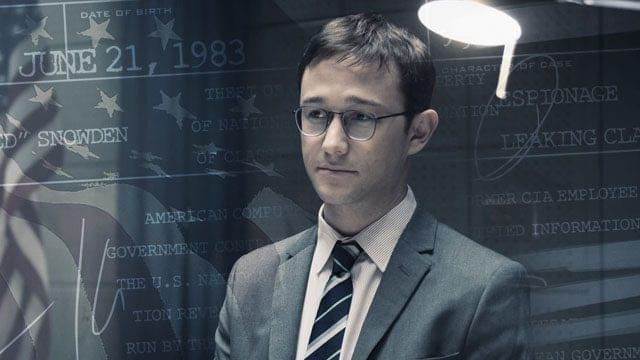
“Snowden,” the story of a man blowing the whistle on a secret government surveillance program, seems like a perfect match for Oliver Stone, a paranoid moonbat who loves a good rant. Yet his docudrama about Edward Snowden is restrained, almost dispassionate in the way it lays out the facts of the story. Where’s the incendiary, provocative Stone? This Stone is soft.
Joseph Gordon-Levitt plays Snowden, first seen here meeting with reporters in Hong Kong in 2013 to reveal what he has learned from his years working directly for the CIA and as a contractor for the NSA. The film hopscotches between this meeting and the past, starting with Snowden’s brief military career (cut short by an injury), moving through his CIA training (where he excels thanks to his computer wizardry), tracking him as he becomes disillusioned by the disparity between what the Agency says it’s doing and what it’s actually doing: monitoring millions of Americans’ phone calls, texts, and private messages without warrants, using the Foreign Intelligence Surveillance Act (FISA) as cover.
Edward acquires a long-suffering girlfriend in the midst of this, Lindsay Mills (Shailene Woodley), a liberal photographer who joshes conservative Edward about converting him. His job demands secrecy, so he can’t tell her about his day at the office, nor can he confide in her his growing discomfort with what he’s involved in. Their relationship is the only human aspect of the film — Edward doesn’t seem to have other friends or family, and his conflicts are mostly internal — but Stone never draws us in, leaving us with no emotional connection to the material. It isn’t an espionage “thriller,” either, except for a few moments of sneaking around here and there.
When interpreting an Oliver Stone movie, it’s usually a safe bet to assume his intention was to outrage us. And what’s presented here certainly raises one’s ire … if one had no prior knowledge of the Edward Snowden affair. Stone, working from a screenplay by Kieran Fitzgerald (“The Homesman”), doesn’t present any theories or assertions beyond what’s been covered in the press, and his editorializing is all in broad strokes. (Basically: the NSA shouldn’t have done this; Snowden was justified in exposing it.) Perhaps we’ve reached the point where actual events have surpassed Stone’s ability to be paranoid about them?
C (2 hrs., 14 min.; )





